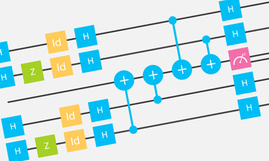|
IBM just announced the availability of their Quantum Experience: a functional general purpose quantum computer that can be accessed, by anyone with an approved project, via the cloud (i.e. Internet). Previously there have been commercial quantum computer efforts, albeit specific purpose ones, by the companies D-Wave and 1Qbit, and projects are underway at Google, NASA, and various academic institutions. These prior efforts have been under constant criticism, as it is questionable if they are even using quantum theory at all, and they are actually outperformed by classical computers working on the same problems. So the jury is still out on if we have achieved this yet or not. Maybe the IBM initiative finally makes this a reality. Check it out, the IBM project is super cool: What I find interesting in all this buzz, all this hype, is that nobody has really, in my opinion, been able to succinctly explain what the heck quantum computing is, and how it actually works. I’m not saying this is not well understood, because clearly it is, it’s just not something that is easy to explain in layman’s terms. Take the Wikipedia explanation:
Got it? Yea, right. This is basically the same explanation everyone gives, although worded differently. Hidden in here is the real explanation, but it’s not completely lucid. The key word in that whole paragraph is the last one: probability. The quantum world, as far as we can currently determine, is a world of probabilities. Things are not here or there, but probably somewhere. Some major historical physicists had serious issues with this, including Albert Einstein who famously said “God does not play dice with the world.” The thing is, all the data from our best particle accelerators keeps confirming that this is reality. All our models based on these concepts keep getting confirmed, the latest being the discovery of the predicted Higgs boson. Canadian Prime Minister Justin Trudeau recently attempted to explain this at a press conference announcing $50 million in funding to the Perimeter Institute for Theoretical Physics for quantum computing research (incidentally D-Wave is a Canadian company). He said this:
Here is the actual video if you would like to see his speech first hand: He may have gotten an applause, but his explanation missed the mark. Throwing together a bunch of relevant buzzwords in a haphazard manner may satisfy the press, but it doesn't help us actually understand any of this. A quantum bit is neither a 1 nor a 0, until measured, then it becomes either a 1 or a 0. So it has the same amount of information holding capacity as a classical binary bit. It is when it decides what the information is that is the difference. I don't mean to downplay the significance of having a politician engaged in science and trying to explain something like this; I wish more would take an interest in advancing our knowledge. So why is this so hard to explain? Because it contradicts our reality. It’s not how we are wired to think. We operate fundamentally at a different cosmic scale than the quantum world. The opposite is also true. The distance from Earth to the center of our galaxy is 27,000 light years. So the light you see when you glance up at that bright spot in the Milky Way has been making the journey to reach your eyes for twenty-seven thousand years! That is a massive, inconceivable, distance. And that is only half way across our own galaxy. The distance to other galaxies? Completely beyond our ability to comprehend. So it stands to reason that if the super large scale is impossible to understand, then the super small scale should also be impossible to understand. Charles Bennett, an Information Theorist at IBM, has an interesting way of looking at this. Not by explaining it, per se, but by forming an analogy to a dream:
Right on! So the quantum world is just a bit surreal.
So here is where you are expecting me to finally give a better explanation. I think I can do that, and I have attempted it in my forthcoming novel, Spheria, which makes heavy use of quantum computing as part of its premise. I can’t wait to share both the book and the explanation with you soon. Please subscribe to my mailing list and I will let you know the day it is released. Cody Leet 5/6/2016
1 Comment
|
Archives
June 2018
Categories
All
|
Photos from tgrauros, Michael Seeley, Fabio Pani


 RSS Feed
RSS Feed
